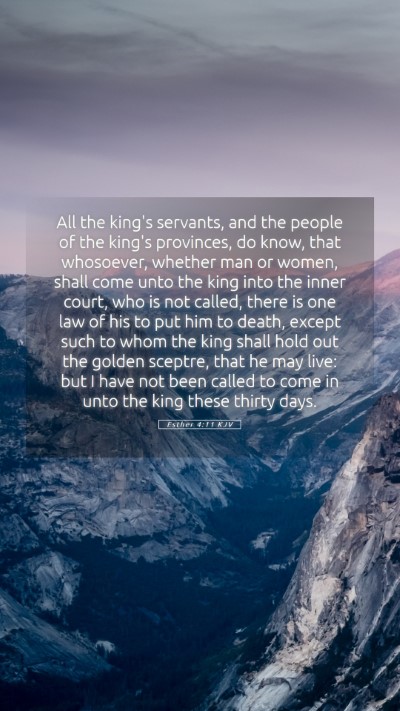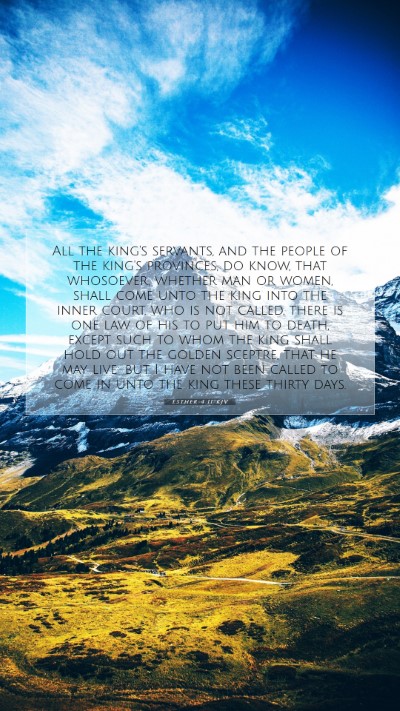Old Testament
Genesis Exodus Leviticus Numbers Deuteronomy Joshua Judges Ruth 1 Samuel 2 Samuel 1 Kings 2 Kings 1 Chronicles 2 Chronicles Ezra Nehemiah Esther Job Psalms Proverbs Ecclesiastes Song of Solomon Isaiah Jeremiah Lamentations Ezekiel Daniel Hosea Joel Amos Obadiah Jonah Micah Nahum Habakkuk Zephaniah Haggai Zechariah MalachiEsther 4:11 Meaning
What is the meaning of Esther 4:11?
All the king's servants, and the people of the king's provinces, do know, that whosoever, whether man or women, shall come unto the king into the inner court, who is not called, there is one law of his to put him to death, except such to whom the king shall hold out the golden sceptre, that he may live: but I have not been called to come in unto the king these thirty days.
Esther 4:11 Bible Verse Meaning
Understanding Esther 4:11
Esther 4:11 is a pivotal verse in the narrative of Esther, one of the unique books of the Bible that highlights the role of divine providence and human responsibility. In this verse, Esther conveys a critical message regarding the Jewish law and her predicament as queen, revealing much about her character and the cultural context of the time.
Bible Verse Meaning
This verse states: “All the king's servants and the people of the king's provinces know that if any man or woman goes to the king inside the inner court without being called, there is but one law—to be put to death, except the one to whom the king holds out the golden scepter, so that he may live.” Here, we can discern several layers of meaning.
- Fear of Authority: The edict reflects the rigid hierarchy and the absolute authority of the Persian king. Esther highlights the lethal consequences of approaching the king without his summons, illustrating the dangers and fears that governed life in the royal court.
- Esther’s Dilemma: As a Jewess, Esther is acutely aware of the potential ramifications of approaching the king to plead for her people’s safety. Her initial hesitance indicates the seriousness of the situation and her understanding of the peril involved.
- The Golden Scepter: The mention of the golden scepter symbolizes grace and mercy. It suggests that although Esther faces a dire situation, there is a hope and a chance for intercession if the king extends his scepter.
Bible Verse Interpretations
Using commentaries by Matthew Henry, Albert Barnes, and Adam Clarke, we can see deeper interpretations arise from Esther's statement:
- Divine Appointment: Matthew Henry emphasizes that Esther’s position is of God’s providence. Her royal status is viewed not merely as luck but as part of a divine plan to save her people.
- The Role of Intercession: Albert Barnes explains that Esther’s future actions lead us to understand the importance of intercession. Her plea symbolizes the need for representations before authority, which can be paralleled with prayers made by believers on behalf of others.
- Complexity of Cultural Norms: Adam Clarke notes the cultural significance of royal edicts. He comments on Esther’s respect to the laws of the Persian court, which safeguard the sanctity of royal authority.
Historical Context of Esther 4:11
The historical background of the Book of Esther is key to understanding this verse. The narrative occurs during the Persian Empire, where the Jewish people had been exiled and faced potential annihilation. Esther's fear of approaching the king mirrors the social, legal, and familial roles that women held during this period.
Applying Esther 4:11 to Daily Life
This verse encourages individuals to understand the gravity of approaching authorities and making difficult decisions. Just as Esther wore the crown, leading her people, believers can reflect on their responsibilities in advocating for justice and mercy. Esther's inner conflict serves as a reminder of the courage needed to confront daunting situations.
Cross References
- Esther 5:1-2: Esther's eventual approach to the king, demonstrating her bravery.
- Daniel 2:48-49: A parallel about serving in a royal court and advocating for one's people.
- Hebrews 4:16: The concept of approaching God's throne with confidence, reflecting on Esther’s plea.
Conclusion
The study of Esther 4:11 combines historical context, character analysis, and divine purpose. By examining this passage through the lens of respected commentaries and the application of its teachings, readers gain a profound understanding. This verse encourages the pursuit of justice, courage in the face of fear, and a recognition of the significant influence of intercession in both spiritual and earthly realms.


